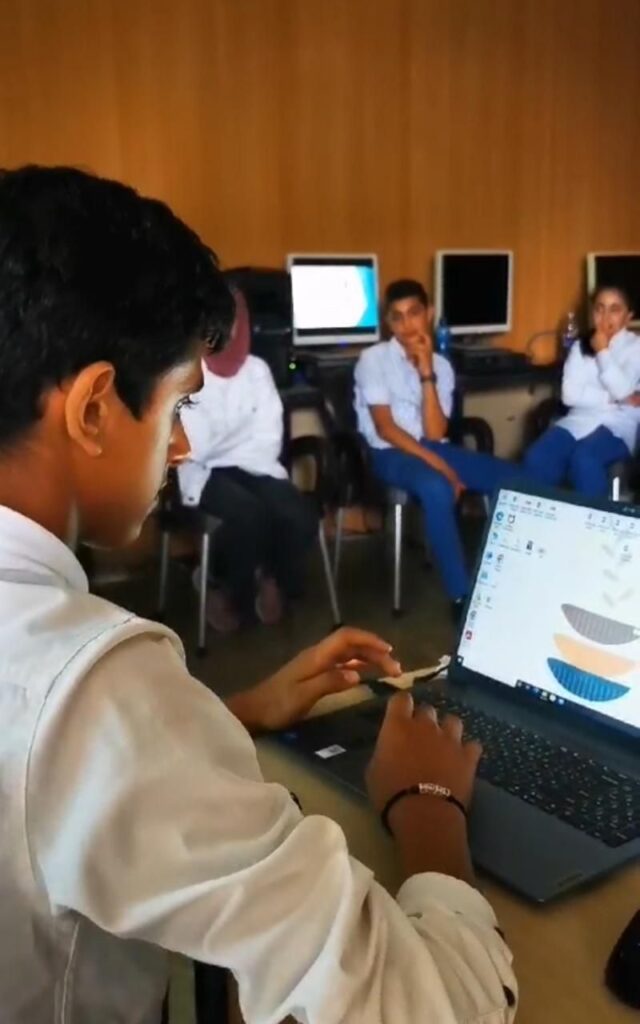Project Context
Al-Baraah School, located in Fnaideq, Akkar, is dedicated to providing quality education to around 1,400 students.
However, this school, just like many others in Lebanon that are often overlooked, is grappling with a harsh reality. They lack the means and opportunities to help our students develop the critical 21st-century skills needed in today’s tech-driven world. To make matters worse, the prolonged economic crisis has made it even tougher for the school to fulfill its mission of preparing our students with the essential skills and knowledge they need to thrive in their educational journey.
Moreover, despite having a computer lab, the institution faced obstacles as teachers lacked essential digital skills. This case study delves into how the school addressed these challenges.
Project Description
The project’s core objective was to empower both teachers and students with digital literacy skills, enabling them to effectively integrate technology into their educational curricula in different subjects and grades.
As a start, the school strategically collaborated with Digital Opportunity Trust (DOT) Lebanon, under their EdTech program which helps educational institutions to integrate technology into education systems and transform the way teachers and students interact.
As part of the comprehensive strategy that we helped develop, the school piloted the intervention to enhance digital literacy and teaching methodologies, with a particular focus on improving the performance of grade 6 students in their scientific subjects. This began with intensive training for 11 teachers, equipping them with crucial computer skills to empower their students.
Crucially, the school didn’t stop there, as the ultimate aim is to help them institutionalize their learnings. The knowledge gained by these teachers was seen as a catalyst for broader change. Other educators within the institution were encouraged to embrace digital literacy, extending the benefits of this newfound knowledge throughout the school. This inclusive approach was a cornerstone of their overarching strategy.
The students, in turn, were encouraged to take charge of their learning journey, adopting a self-directed approach inspired by the principles of a flipped classroom methodology. This approach fostered a dynamic, student-centric environment, emphasizing critical thinking, collaboration, and the development of autonomy as students took ownership of their education.
Within just 100 days, these students made significant strides in their digital self-learning skills. They not only learned to research credible information online but also became adept at creating compelling PowerPoint presentations. They developed proficiency in conducting research and extracting valuable insights from the information they gathered. This transformation in teaching and learning had a profound impact on both students’ digital literacy and their academic achievements.
The school’s team made the strategic decision to internally scale where the rest of the teachers will transmit the newly acquired knowledge across other classes and subjects.

Achievements to Date
- Based on a pre and post-test and rubric, 80% of the students demonstrated success in navigating the internet, Microsoft office use,
- The digital literacy rates for the grade 6 students increased from 0% to 100%.
- The rubric results indicated a boost in the students’ self-confidence. The findings unveiled that the students cultivated a stronger sense of equality and social justice among themselves. This transformation was attributed to their improved access to skills and resources, which paralleled those available to students in larger cities across Lebanon.
The Human Heartbeat
The project had a profoundly positive impact on the school and its community members. One touching story was about a young girl (whose name we’ve chosen to keep anonymous) who used to face difficulties in participating actively in class due to her shyness. However, it became evident that, following the project, her interpersonal skills blossomed, and she displayed them with newfound confidence. Her increased enthusiasm for school clearly demonstrated the significant and positive influence of this initiative on students’ personal development.
